Filter by
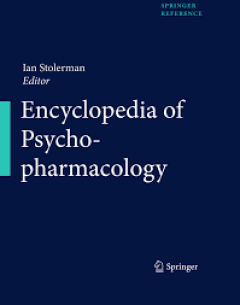
Encyclopedia of Psychopharmacology
Psychopharmacology is the study of the effects of psychoactive drugs on the functioning of the central nervous system at all levels of analysis, thus embracing cognition, behavior, psychological states, neurophysiology, neurochemistry, gene expression, and molecular biology. It includes, as an integral part of its domain, the interaction of environmental and genetic factors with psychoactive dr…
- Edition
- -
- ISBN/ISSN
- 978-3-642-36172-2
- Collation
- 125 b/w illustrations, 91 illustrations in colour
- Series Title
- -
- Call Number
- -
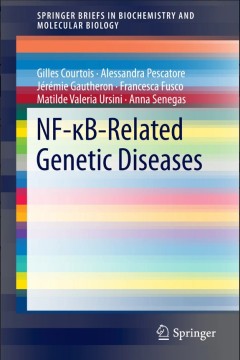
NF-κB-Related Genetic Diseases
This book presents the diverse clinical, cellular and molecular manifestations of NF-KB-related genetic diseases. It shows that studying patient-related pathologies affecting the components of the NF-KB signaling pathway offers the opportunity to understand the various functions of NF-KB in humans, complementing studies performed with mouse models. In addition, people treating those patients ac…
- Edition
- 1
- ISBN/ISSN
- 978-3-319-25848-5
- Collation
- XII, 70
- Series Title
- SpringerBriefs in Biochemistry and Molecular Biology
- Call Number
- -

Murine Models, Energy Balance, and Cancer
This volume provides a transdisciplinary and translational review of many of the leading murine models used to study the mechanisms, mediators and biomarkers linking energy balance to cancer. It provides a review of murine models that should be of interest to basic, clinical and applied research investigators as well as nutrition scientists and students that work in cancer prevention, cancer co…
- Edition
- 1
- ISBN/ISSN
- 978-3-319-16732-9
- Collation
- XV, 295
- Series Title
- Energy Balance and Cancer
- Call Number
- -
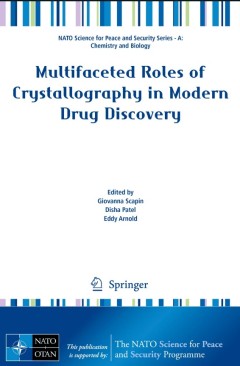
Multifaceted Roles of Crystallography in Modern Drug Discovery
The present work offers a snapshot of the state-of-the-art of crystallographic, analytical, and computational methods used in modern drug design and development. Topics discussed include: drug design against complex systems (membrane proteins, cell surface receptors, epigenetic targets, and ribosomes); modulation of protein-protein interactions; the impact of small molecule structures in drug d…
- Edition
- 1
- ISBN/ISSN
- 978-94-017-9718-4
- Collation
- XI, 240
- Series Title
- NATO Science for Peace and Security Series A: Chemistry and Biology
- Call Number
- -

Emerging and Evolving Topics in Multiple Sclerosis Pathogenesis and Treatments
Over the past decade, we have made great advances in the field of multiple sclerosis (MS) research, and this book focuses on those advances in MS pathogenesis and treatment. While some of these advances have been through new approaches and ideas that have emerged in the last decade such as the newly identified protective role that amyloid proteins may play in MS or the use of helminths to treat…
- Edition
- -
- ISBN/ISSN
- 978-3-319-25543-9
- Collation
- XII, 235
- Series Title
- -
- Call Number
- -

Molecular and Cellular Mechanobiology
This book will cover the cutting-edge developments in molecular and cellular mechanobiology to date. Readers will have a clear understanding of mechanobiology at the molecular and cellular levels, encompassing the mechanosensors, transducers, and transcription. An integrative approach across different scales from molecular sensing to mechanotransduction and gene modulation for physiological reg…
- Edition
- 1
- ISBN/ISSN
- 978-1-4939-5615-9
- Collation
- XIII, 302
- Series Title
- Physiology in Health and Disease
- Call Number
- -
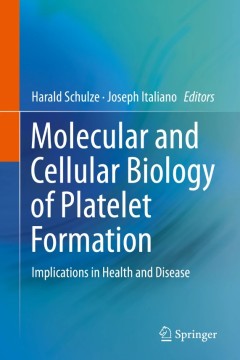
Molecular and Cellular Biology of Platelet Formation
This book gives a comprehensive insight into platelet biogenesis, platelet signal transduction, involvement of platelets in disease, the use of diverse animal models for platelet research and future perspectives in regard to platelet production and gene therapy. Being written by international experts, the book is a concise state-of-the art work in the field of platelet biogenesis, biology and r…
- Edition
- 1
- ISBN/ISSN
- 978-3-319-39560-9
- Collation
- X, 460
- Series Title
- -
- Call Number
- -

Molecular Therapies of Cancer
Molecular Therapies of Cancer comprehensively covers the molecular mechanisms of anti-cancer drug actions in a comparably systematic fashion. While there is currently available a great deal of literature on anti-cancer drugs, books on the subject are often concoctions of invited review articles superficially connected to one another. There is a lack of comprehensive and systematic text on the t…
- Edition
- 1
- ISBN/ISSN
- 978-3-319-13277-8
- Collation
- XV, 488
- Series Title
- -
- Call Number
- -

Molecular Targets and Strategies in Cancer Prevention
The book focuses on the understanding of molecular pathways by which normal cell progress to the definable stage of cancer. The chapters explore microbiota and chronic inflammation, multiple myeloma chemoprevention, microRNAs, cancer regulation, liquid biopsies, and angiogenesis. Recent advances of molecular risk assessment, tumor microenvironment, microneoplasia, malignant gene expressions are…
- Edition
- 1
- ISBN/ISSN
- 978-3-319-31252-1
- Collation
- V, 180
- Series Title
- -
- Call Number
- -
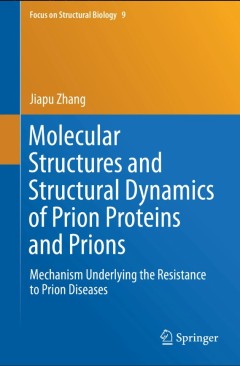
Molecular Structures and Structural Dynamics of Prion Proteins and Prions
This monograph is the first easy-to-read-and-understand book on prion proteins' molecular dynamics (MD) simulations and on prions' molecular modelling (MM) constructions. It enables researchers to see what is crucial to the conformational change from normal cellular prion protein (PrPC) to diseased infectious prions (PrPSc), using MD and MM techniques. As we all know, prion diseases, caused by…
- Edition
- 1
- ISBN/ISSN
- 978-94-017-7317-1
- Collation
- XIX, 355
- Series Title
- Focus on Structural Biology
- Call Number
- -
 Computer Science, Information & General Works
Computer Science, Information & General Works  Philosophy & Psychology
Philosophy & Psychology  Religion
Religion  Social Sciences
Social Sciences  Language
Language  Pure Science
Pure Science  Applied Sciences
Applied Sciences  Art & Recreation
Art & Recreation  Literature
Literature  History & Geography
History & Geography